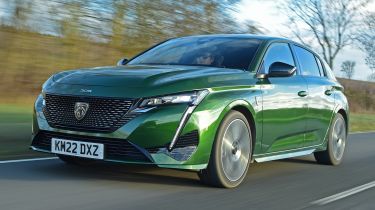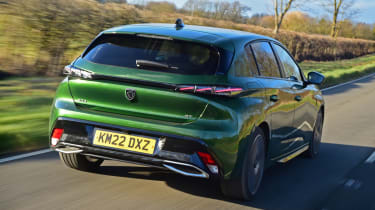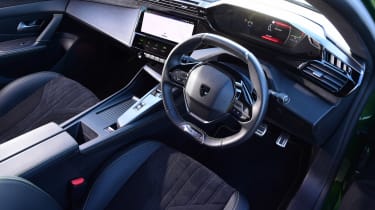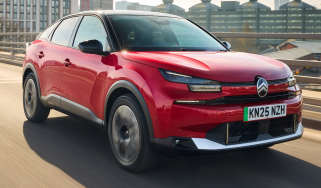New Peugeot 308 diesel 2023 review
Peugeot is still catering for diesel buyers with the new 308 1.5 BlueHDi family hatch

Verdict
Not long ago almost every family hatchback offered a diesel option. But buyer demands have dramatically shifted in recent years to make cars such as this 308 BlueHDi an exception to the norm. That explains why Peugeot hasn’t invested much into developing this diesel powertrain. There are still plenty of positives however, with the usual 308 technology, design and build quality on offer, but we’d stick with petrol power.
It's no secret that the popularity of diesel has been dented in the UK – sales of cars that use the black pump dropped by 38.9 per cent in 2022. However, Peugeot still believes there’s enough demand to offer its latest 308 with a diesel option.
The third-generation 308 symbolises Peugeot’s ‘Power of Choice’ stance, with a variety of powertrains, including two plug-in hybrids, a petrol and, soon, the all-electric e-308. This diesel is certainly not as modern as its siblings, in fact, it’s broadly the same BlueHDi unit found in the old car.
With that in mind, the 308 diesel doesn’t offer any more power than its predecessor (or indeed the petrol model). The 1.5-litre, four-cylinder turbocharged unit produces 128bhp and 300Nm, but the new car has also gained an extra 42kg, so it accelerates from 0-62mph in 10.6 seconds, which is 1.2 seconds slower than the previous generation. What is new is the eight-speed automatic transmission – now a standard feature on every new 308.
Used - available now
Given that diesel is rather unfashionable right now, the fact that there are no exterior details hinting at this car’s fuel might well be a good thing. But as soon as you push the starter button, the BlueHDi rattles into life, giving the game away.
There are three drive modes available: Normal, Eco and Sport. As you’d expect, the default setting is Normal and here the 308 offers up fairly light steering from a dinky steering wheel that is core to Peugeot’s i-Cockpit layout (more on this later). You can add some extra steering weight in Sport, and overall the rack is quick enough but not particularly engaging.
Activating Sport mode also delivers sharper response to accelerator inputs, which is especially helpful around town where the slightly laboured power delivery of the diesel engine can be a little annoying. On more dynamic roads, there’s plenty of grip to be had, but the 308 never encourages you to play.
The third and final tweak that the driving modes control is the automatic gearbox. Select Normal and the changes are slow and slurred, while in Eco they’re even more laboured. However, Sport delivers a much sharper shift, not holding on to gears for too long either.
Despite a weight gain over the previous model, the 308 diesel is still 318kg lighter than the PHEV variant, although the diesel felt a little less settled on the road. Our car came in range-topping GT Premium trim (although without the electrically operated and heated front seats), which is fitted with 18-inch wheels as standard.
On rough roads, the surprisingly firm suspension has a habit of jiggling you about a bit and the tyres transmit a lot of road noise to the cabin. On the motorway, however, we found the 308 settled down, offering cruising refinement on par with the petrol or PHEV versions.
We’ve spoken previously about how impressive the new 308 is inside, and this range-topping GT certainly looks the part. The design is great, but everything is also well screwed together, with no creaks or rattles anywhere in the cabin.
Ergonomics are less good in the 308. Peugeot’s i-Cockpit layout is described by the brand as “the best driving experience” and “energising and delightful”, with the instruments viewed over the top of the steering wheel. The resulting layout conveys plenty of sporty intent, but there are still some issues for some drivers with the basic relationship between seat, steering wheel and the view of the dials.
It remains a potential blot on an otherwise superb copybook when it comes to the interior, which is full of premium touches. The i-Toggle system below the 10-inch central touchscreen is easy to use, while the main display is clear and responds quickly enough to inputs, although the screen layout is a little odd with the onus placed on a small menu selection.
For rear passengers things are a little less cheerful because the rear bench is upright and there’s not a lot of headroom. This compromise to rear passenger space benefits the boot, though. There’s 412 litres of space in diesel trim (PHEV versions make do with 361 litres), which beats the VW Golf, Ford Focus and Kia Ceed.
This 1.5 BlueHDi does have a trump card in the form of company car tax. It emits 121g/km of CO2, so it sits two tax bands lower than the petrol model. As for efficiency, Peugeot claims 54.1mpg, although that’s only about 8mpg more than the petrol model, which costs £1,400 less.
| Model: | Peugeot 308 BlueHDi GT Premium |
| Price: | £33,090 |
| Engine: | 1.5-litre 4cyl turbodiesel |
| Power/torque: | 128bhp/300Nm |
| Transmission: | Eight-speed automatic, front-wheel drive |
| 0-62mph: | 10.6 seconds |
| Top speed: | 130mph |
| Economy: | 54.1mpg |
| CO2: | 121g/km |
| On sale: | Now |

















